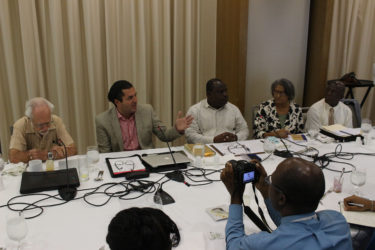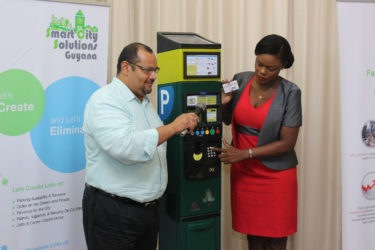Parking meters are scheduled to become operational around the capital city by mid-December, according to Managing Director of Business Development of contractor Smart City Solutions (SCS) Amir Oren.
The announcement was made during a media briefing yesterday morning at the Guyana Marriott Hotel, where it was also announced that the Georgetown City Council would be collecting 20% of the gross income annually after the meters are operationalised.
The parking meter deal has attracted widespread of criticisms since it was announced and Georgetown’s Deputy Mayor Sherod Duncan has maintained a call for the deal to be scrapped in light of City Hall’s failure to follow the procurement law and invite bids for the project.

The city and the company later amended the contract following recommendations from two reviews that were done by the Ministry of Finance and the Attorney-General’s Chambers, which both indicated that the initial agreement put the city at a disadvantage.
At this stage, SCS is engaged in preparatory works. The company announced that it has started to earmark space around the city where the meters would be located.
Employees are also being trained, Oren said, while noting that they are being educated in the areas of customer service and security.
The meters, when installed, will cover the city’s main commercial district.
Oren said the project is divided into two phases, with first phase expected to see the installation of 157 meters to cover 3,237 spaces, while in the second phase, expected to be implemented in the first three months of 2017, approximately 163 meters would be installed to cover 4,000 spaces.
The meters would be operational from Monday to Saturday, from 7 am to 7pm.
Questioned about arrangements for businesses and private taxi operators, Oren explained that they are currently working out special packages for businesses who approached them while there would be designated areas for taxi operators. However, he said if the operators choose not to operate from the allocated spaces and park in metered spaces, they would have pay the rate.

The rate for the parking meters is $50 for 15 minutes. The minutes would be sold on prepaid cards around the city. It was stated that if a person spends less than the time bought, there would be no refund.
During a demonstration, which was conducted by SCS employees, it was stated that persons can purchase cards from vendors and the company’s offices that would be set up across the city. More than 80 vendors would be available to customers at the start of the operation.
Oren stated that the contract does not allow the company to increase its rates within two years and Town Clerk Royston King was quick to point out that the under the contract the council would be the body to approve any increase that is suggested.
According to Alicia Bess, SCS Accounting Manager, the eco-friendly parking meter is simple and easy to use. She explained that a person would first enter the digits of the space they would be occupying, then would be asked to enter the estimated time they would spend conducting business, after which they would have to swipe their cards. Once the transaction is complete, they would receive a receipt to place on the dashboard of their vehicle. No cash would be accepted by the machine as every transaction would be done electronically.
The transaction takes less than a minute to be completed.
Demonstrations would also be aired regularly on television before the company officially rolls out the project.
While the machines on the road would not accept cash, Oren indicated that they would be placing 20 specialised units at different locations of the city to allow mobile cash transactions. He added that in future persons would be able to use an app designed by the company to buy additional time if desired.
Pressed on whether there were enough consultations on the project, Oren said he thought so. “This project has been in the works for some 20 years, but when we were invited to join it I think we were the leading push. We have done this before and we know how to do this. We have spoken to different constituencies, we have had our people on the streets doing demonstrations, interacting with people, we have had focus groups, we have met the Private Sector Commission, we have met with important businesses around the city and [they] indicated to us their issues. We are not hiding, we are here, we have had plenty conversations,” he said.
Oren also emphasised the potential of the project to benefit the city economically and also ease congestion. “From the very beginning, since we were invited, we saw the great lack of order on the streets and the problem it causes and we knew that our solution would be good in correcting some of those issues. And also bringing with it all sorts of benefits from economic and quality of life perspectives,” he added, while noting his belief that within six months the city would experience a change in the current chaotic traffic.





